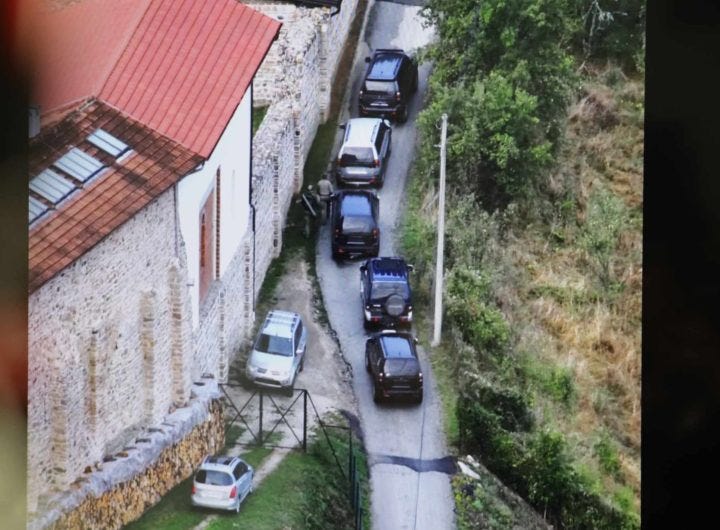White House warns of Serbian military buildup on Kosovo border, calls on Serbia to withdraw
“We are monitoring a large Serbian military deployment along the border with Kosovo,” NSC spokesman John Kirby said Sept. 29. “We are calling on Serbia to withdraw those forces.”
The White House warned today that it is monitoring an “unprecedented” Serbian military build-up on the Kosovo border over the past week, and urged Serbia to pull its troops back to deescalate rising tensions.
“We are monitoring a large Serbian military deployment along the border with Kosovo, that includes an unprecedented staging of advanced Serbian artillery, tanks and mechanized infantry units,” National Security Council spokesperson John Kirby told reporters on a virtual gaggle today (Sept. 29). “We believe this is a very destabilizing development. And it’s basically taking place over the past week or so.”
“We are calling on Serbia to withdraw those forces from the border and to contribute to lowering the temperature and the tension,” Kirby said.
Secretary of State Antony Blinken called Serbian President Aleksander Vucic today to “convey our concerns about these incidents and to underscore the need for immediate de-escalation and a return to dialogue,” Kirby said. National Security Advisor Jake Sullivan spoke with Kosovar Prime Minister Albin Kurti to discuss events and the importance of dialogue, Kirby said.
The North Atlantic Council also met this morning in Brussels to discuss the developments, Kirby said, and has decided for now to increase the presence of NATO-led peacekeeping forces (KFOR) in northern Kosovo, while not yet coming to a decision on whether to send more international peacekeepers to the country, Kirby said. The US has about 600 soldiers in the KFOR force, he said.
The Serbian military build-up follows a sophisticated attack on Sept. 24 involving over 30 Serbian assailants transporting military-grade weapons in a convoy of 20 SUVs, that killed four people, including a Kosovar policeman, in northern Kosovo. Kirby said the attack appeared to involve trained paramilitary operatives and to be well organized.
“That attack was well coordinated and planned,” Kirby said. “It used about 20 SUVs as they were transporting a weapons cache of alarming quantities and sophistication. Much of that weaponry was military grade, including anti-tank rocket launchers, mortar rounds, explosives, tactical gear.” According to Kosovar authorities, the attack involved at least 30 people, which resulted in the death of Kosovar police sergeant.
“This is not the kind of attack that is carried out randomly, or ad hoc…or by some small group,” Kirby said. “The amount and the type of arms that were found represent a threat to the safety not only of Kosovar personnel, but international personnel, including NATO troops.”
“Everyone who was involved in planning and carrying out this attack, they need to be brought to justice,” Kirby said.
“The number of vehicles involved and the types of munitions and weapons certainly allude to a fairly high level of sophistication and resourcing…and training,” Kirby said.
Asked if the US anticipates an imminent Serbian military incursion into Kosovo, Kirby suggested the public urging of Serbia to pull back reflects growing sense of urgency about the situation they have been conveying in diplomatic conversations privately and discussing at NATO in Brussels.
“I’m talking about it here today to make it clear how concerned we are about it,” he said. “But the actual intent [of the buildup], I’m not able to [offer] at this point.”
The public comments back up private conversations with Kosovar and Serbian leaders “to urge the Serbians to pull those troops back,” he said.
“The United States is working with our NATO allies to address these attempts to destabilize Kosovo and undermine the security of its citizens,” Kirby said.
“The North Atlantic Council met earlier today in Brussels to discuss the situation in Kosovo, with NATO allies expressing their deep concern about increasing tensions and noting their readiness to make further adjustments to their posture on the ground,” he said. “In the days ahead, the United States will continue to consult closely with our allies to ensure that the peacekeeping forces’ posture matches appropriately the threat that they face there.”
**



